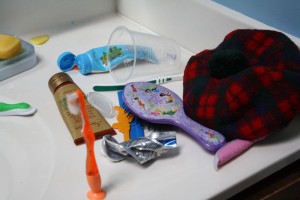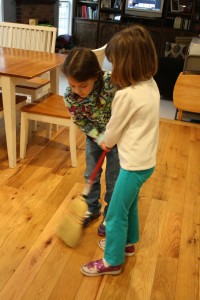What’s your biggest challenge in your home?
Did you say:
- Keeping track of all the kids’ activities and my activities
- Keeping up with the housework
- Planning and getting meals on the table
- Homework hassles
- Procrastination
- Lateness
- Remembering to remember
- Problems with overshopping
- Clutter
- Staying up too late and not getting enough sleep.

Was it one of those things on the list above? A few? All of them??
Have you considered that possibly the problem is not that you are a terrible housekeeper, planner, parent, motivator, etc. Maybe the problem is ADHD or specifically, executive function.
But wait! I just said ADHD and you are thinking but I am NOT a hyperactive kid bouncing off of the walls.
Yes, but in adults, ADHD looks a little different than it does for children and there are three different sub-types of ADHD.
According the the DSM-V. ADHD can be
- Inattentive Type
- Hyperactive/Impulsive Type
- Combined Type
In adults, you are much less likely to see hyperactivity but you will see impulsivity. AND as adults, we have created tools and systems to make our world easier to manage.
Executive functions are parts of our brains that control organization, planning, time management, working memory, impulse control… basically everything that you mentioned on your list at the beginning of this article is handled primarily but the pre-frontal cortex in your brain and specifically the executive function.
Dr. Russell Barkley, PhD says executive function is “Those cognitive abilities needed for goal-directed action” and continues by identifying executive functions as controlling:
- Inhibition
- Time Management
- Organization & Problem-Solving
- Motivation
- Emotional Regulation
On top of all that, it is the executive functions that are most affected by ADHD. Dr. Russell Barkely has suggested that ADHD be renamed ‘Executive Function Disorder’. These functions are one of the last areas of our brains to develop, their development can be delayed by up to 30 percent in the case of ADHD. Whatever development has been reached by the age of 25-30 years old, that is the level of functioning that will remain for the adult.
Does ADHD or and executive function disorder mean that you CAN’T do it? No!
“Imagine a symphony orchestra in which each musician plays his or her instrument very well. If there is no conductor to organize the orchestra and start the players together, to signal the introduction of the woodwinds or the fading out of the strings, or to convey an overall interpretation of the music to all players, the orchestra will not produce good music.” Brown, Thomas PhD. Attention Deficit Disorder. Yale University Press: New Haven, 2005.
Phew! That was pretty heavy. If you are thinking right now that maybe you might be ADHD, I would encourage you to take this quiz offered by Dr. David Goodman of Johns Hopkins University, to find out more.
But, I am not here to give you a diagnosis. Most of the clients I work with are challenged with executive function issues whether from ADHD, brain trauma or other source.
Whatever the source of your disorganization, there is something you can do about it.
Being aware of the source of your challenge is helpful. It will allow you to accept who you are and to stop beating yourself up for things that are outside of your control.
Here is the short list of suggestions:
1. Know yourself and your family members.
Do an inventory of your strengths, challenges, age, sensitivities, strongest modality.
Keeping track has LESS to do with organizing gadgets and MORE to do with your routines & habits.
2. Use what you know
Use what you know about your strongest modality to play to your strengths. For example if you are a visual person, use attractive containers to neatly organize your things. If your strength is in language and words, create a written guide to managing your stuff. If you are an auditory learner, speak your tasks and replay them to yourself or play music while you work. If you are tactilely inclined, write each task to be completed on a textured slate and put them in a basket as you complete them. Be creative!
3. Assign homes to your things
and know where that place is (label it, color code, etc)
4. Create systems and habits
5. Don’t SKIMP
For those without EF challenges diet, sleep and exercise are helpful but with EF Challenges diet, sleep and exercise are a deciding factor in success!
6. Simplify
“The monotony and solitude of a quiet life stimulates the creative mind.” –Albert Einstein
This trend towards mindfulness and simplicity is excellent for EF challenges. Reducing distraction and supports your brain
For more events and information on this topic and others, click here.














No comments yet.